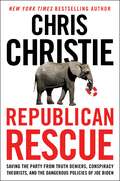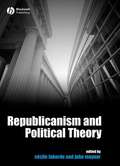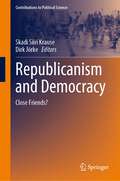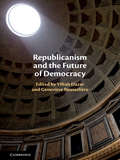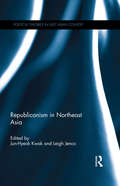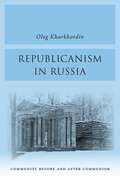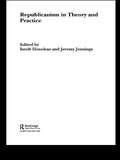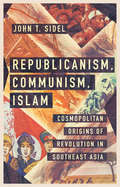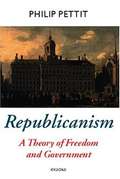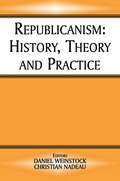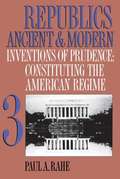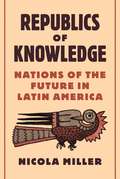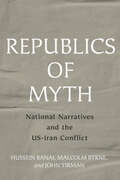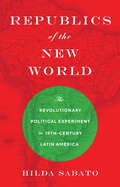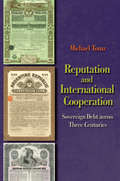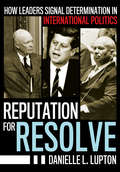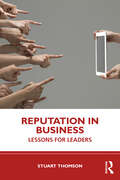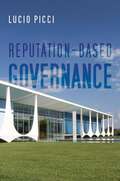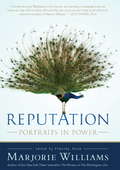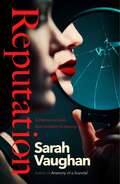- Table View
- List View
Republican Rescue: My Last Chance Plan to Save the Party . . . And America
by Chris ChristieEnough with the infighting, the truth-denying, the wild conspiracy claims, the looking backward, and the refusal to focus on the dangerous Biden agenda. Here&’s Chris Christie&’s urgent guide for recapturing Republican glory and winning elections again, told with all the New Jersey frankness and news-breaking insights that have made the two-term governor and presidential candidate an indispensable voice and instant New York Times bestselling author. As governor of New Jersey and a key Trump insider and longtime friend, Chris Christie has always been known for speaking his mind. Now that the depressing 2020 election is finally behind us, he shares his bold insights on how a battered Republican Party can soar into the future and start winning big elections again. The wrong answers are everywhere. Dangerous conspiracy theorists. A tired establishment. Truth deniers and political cowards. In Republican Rescue, Christie reveals exactly how absurd grievances and self-inflicted wounds sabotaged Donald Trump&’s many successes and allowed Democrats to capture the White House, the House, and Senate in two years—a first for the GOP since the days of Herbert Hoover. In his frank and compelling voice, Christie dissects the last year of the Trump administration—which provoked nothing but conspiracy theories and infighting—and he lays out an honest and hopeful vision, explaining how Republicans can capture the future and save America from today&’s damaging Democratic excesses. The core Republican values of Abraham Lincoln, Teddy Roosevelt, and Ronald Reagan are as relevant now as they&’ve ever been, Christie writes. Opportunity for all. A strong national defense. Leaders we can all be proud of. Americans in charge of their own lives. A federal government that answers to the people—not the other way around. But these Republican ideals need to be reinvigorated with fresh clarity and open arms. Christie watched in horror as some in his beloved party embraced paranoia and explained away violence. Determined to restore the party&’s integrity and success, he shows how to build a movement voters will flock to again, a Republicanism that&’s blunt, smart, conservative, potent, and perfectly suited for the 21st century.
Republicanism And Political Theory
by Cecile Laborde John Maynor"Republicanism and Political Theory" is the first book to offer a comprehensive survey of republican political theory. Critically assessing the historical credentials, conceptual coherence and normative proposals of republicanism, it brings together original contributions from leading international scholars. The volume focuses on four main areas: liberty in the republican tradition; freedom as non-domination and its critics; the borders of republicanism; and new republican debates, reflecting upon the contribution that republicans have made to our understanding of political life. Individual chapters are closely related to one another, providing readers with valuable insight into the main debates taking place between republicans and their critics. An essential text for students in political theory and political science, this volume also serves as an invaluable resource for research scholars in political philosophy, intellectual history, law, international relations, European studies, and gender studies.
Republicanism and Democracy: Close Friends? (Contributions to Political Science)
by Skadi Siiri Krause Dirk JörkeThis book discusses whether democracy and republicanism are identical, complementary, or contradicting ideas. The rediscovery of classic republicanism a few decades ago made it clear how profoundly modern notions of democracy had been shaped by the republican tradition. But defining these two concepts remains difficult, and the views diverge widely. The overarching aim of this book is to discuss the extent to which democracy and republicanism are identical, complementary or mutually contradicting ideals / ideas. Pursuing this open approach to the subject means calling into question a widely used formula according to which modern democracy is composed of liberal principles such as individualism, the rule of law and human rights, on the one hand, and of republican principles such as focusing on the common good and popular sovereignty, on the other. This book will appeal to students, researches, and scholars of political science interested in a better understanding of political theory and political history.
Republicanism and the Future of Democracy
by Yiftah Elazar Geneviève RousselièreDemocracies are in crisis. Can republican theory contribute to reforming our political norms and institutions? The 'neo-republican turn' has seen scholars using the classical republican tradition in reconstructing and developing a vision of public life as an alternative to liberalism. This volume offers new perspectives from leading scholars on how republicanism can help transform democratic theory and respond to some of its most pressing challenges. Drawing on this recent revival of republican political thought, its chapters reflect on such issues as the republican definition of freedom as nondomination and its relation to democracy and populism, the ideal of the common good, domination in the workplace and in the family, republicanism in a globalized world, and radical republican politics. It will appeal to researchers and students in political theory, political philosophy and the history of ideas, and anyone interested in gaining greater insight into the prospects and challenges of republican democracy in today's world.
Republicanism in Northeast Asia (Political Theories in East Asian Context)
by Jun-Hyeok Kwak Leigh JencoAs rapid economic development brings increasing uncertainty in East Asia, interest in a new version of republicanism, termed iscalled neo-Roman republicanism, is growing across the region. Conceptualized as liberty as non-domination, this new form of republicanism has inspired not only Western but also East Asian political theorists. However, neo-Roman republican ideas in Northeast Asian countries continue to face serious conceptual and political challenges, which scholarly literature on both republicanism and on East Asian politics has largely failed to confront. This book addresses these challenges by surveying the latest theoretical contributions to the studies of republicanism in Western countries and the latest interpretations of how republicanism, including both communitarian republicanism and neo-Roman republicanism, has been appropriated in countries in East Asia. In particular, it deals with the key question of whether liberty as non-domination can work in non-Western contexts where the fundamental tenets of liberal democracy, such as moral individualism and value pluralism, do not predominate. Across three sections, the chapters first provide a conceptual overview of republicanism as a global political theory, they then consider how republicanism has historically been received, resisted, and translated into East Asia., and Ffinally, they examine how historically informed possibilities fit with the emergent needs of contemporary Northeast Asian societies. Overall, the contributors show that republicanism is an always-ongoing project, whose terms must be interpreted and translated into the various communities they inform. Normative considerations about whether or how republicanism applies in East Asia cannot be divorced from historical and empirical approaches which consider the various ways in which republican ideals reflect the realities of life there. Dealing with the issue of republicanism from a new, comparative perspective, this book will have broad appeal to students and scholars of Asian studies, comparative political theory, political philosophy, sociology, and history.
Republicanism in Russia: Community Before and After Communism
by Oleg KharkhordinMarxism was the loser in the Cold War, but Oleg Kharkhordin is not surprised that liberal democracy failed to take root after the Soviet Union’s dissolution. He suggests that Russians find a path to freedom by looking to the classical tradition of republican self-government and civic engagement already familiar from their history and literature.
Republicanism in Theory and Practice: Confronting Theory And Practice (Routledge/ECPR Studies in European Political Science #Vol. 41)
by Iseult Honohan Jeremy JenningsRecent claims that civic republicanism can better address contemporary political problems than either liberalism or communitarianism are generating an intense debate. This is a sharp insight into this debate, confronting normative theory with historical and comparative analysis. It examines whether republican theory can address contemporary political problems in ways that are both valuable and significantly different in practice from liberalism. These expert authors offer contrasting perspectives on issues raised by the contemporary revival of republicanism and adopt a variety of methodological approaches to address the practical implications of republican thought within a coherent thematic framework. This book also *clarifies core themes and contested areas of republican thought, especially the notion of liberty, the specific political institutions needed to realize it, and the nature of solidarity among citizens. * shows how republicanism continued to influence the development of liberal thought in nineteenth century Britain * examines the development of alternative republican discourses, including the established political practice and ideology of the French republican tradition * applies republican perspectives to contemporary political concerns such as the creation of social trust and the expansion of public accountability * explores the implications of republican theory for policy areas including houses, education and marriage in diverse multicultural societies This book will be of great interest to researchers and students studying republicanism in political science history, social policy and education. In addition, it is a valuable resource for those concerned with citizenship, democratic theory, multiculturalism, nationalism and patriotism, and politics beyond the nation-state.
Republicanism, Communism, Islam: Cosmopolitan Origins of Revolution in Southeast Asia
by John T. SidelIn Republicanism, Communism, Islam, John T. Sidel provides an alternate vantage point for understanding the variegated forms and trajectories of revolution across the Philippines, Indonesia, and Vietnam, a perspective that is de-nationalized, internationalized, and transnationalized. Sidel positions this new vantage point against the conventional framing of revolutions in modern Southeast Asian history in terms of a nationalist template, on the one hand, and distinctive local cultures and forms of consciousness, on the other. Sidel's comparative analysis shows how—in very different, decisive, and often surprising ways—the Philippine, Indonesian, and Vietnamese revolutions were informed, enabled, and impelled by diverse cosmopolitan connections and international conjunctures. Sidel addresses the role of Freemasonry in the making of the Philippine revolution, the importance of Communism and Islam in Indonesia's Revolusi, and the influence that shifting political currents in China and anticolonial movements in Africa had on Vietnamese revolutionaries. Through this assessment, Republicanism, Communism, and Islam tracks how these forces, rather than nationalism per se, shaped the forms of these revolutions, the ways in which they unfolded, and the legacies which they left in their wakes.
Republicanism, Rhetoric, and Roman Political Thought
by Daniel J. KapustRepublicanism, Rhetoric, and Roman Political Thought develops readings of Rome's three most important Latin historians – Sallust, Livy and Tacitus – in light of contemporary discussions of republicanism and rhetoric. Drawing on recent scholarship as well as other classical writers and later political thinkers, this book develops interpretations of the three historians' writings centering on their treatments of liberty, rhetoric, and social and political conflict. Sallust is interpreted as an antagonistic republican, for whom elite conflict serves as an outlet and channel for the antagonisms of political life. Livy is interpreted as a consensualist republican, for whom character and its observation helps to maintain the body politic. Tacitus is interpreted as being centrally concerned with the development of prudence and as a subtle critic of imperial rule.
Republicanism: A Theory of Freedom and Government
by Philip PettitThis is the first full-length presentation of a republican alternative to the liberal and communitarian theories that have dominated political philosophy in recent years. The latest addition to the acclaimed Oxford Political Theory series, Pettit's eloquent and compelling account opens with an examination of the traditional republican conception of freedom as non-domination, contrasting this with established negative and positive views of liberty. The first part of the book traces the rise and decline of this conception, displays its many attractions, and makes a case for why it should still be regarded as a central political ideal. The second part of the book looks at what the implementation of the ideal would require with regard to substantive policy-making, constitutional and democratic design, regulatory control and the relation between state and civil society. Prominent in this account is a novel concept of democracy, under which government is exposed to systematic contestation, and a vision of state-societal relations founded upon civility and trust. Pettit's powerful and insightful new work offers not only a unified, theoretical overview of the many strands of republican ideas, but also a new and sophisticated perspective on studies in related fields including the history of ideas, jurisprudence, and criminology.
Republicanism: History, Theory, Practice
by Daniel Weinstock Christian NadeauIn this collection of writings, leading historians of political thought and political theorists provide an overview of traditional and contemporary republicanism. The first part of the book presents studies of ancient and modern versions of republicanism in Athenian and Roman political thought, as well as in Machiavelli and Montesquieu.The second part focuses on some of the key questions that confront contemporary thinkers, such as: * What ought one to expect of a good state and civil society? * What are the conditions for deliberative democracy?* What are the theoretical implications of a republican conception of political liberty?The essays in this volume advance the debate over republicanism, through both a rigorous philosophical investigation of republicanism's main sources and careful analysis of its meaning.
Republicans Buy Sneakers Too: How the Left Is Ruining Sports with Politics
by Clay TravisNational Bestseller!Sports media superstar Clay Travis wants to save sports from the social justice warriors seeking to turn them into another political battleground.Have you ever tuned into your favorite sports highlights show, only to find the talking heads yammering about the newest Trump tweets or what an athlete thinks about the second amendment? The way Clay Travis sees it, sports are barely about sports anymore. Whether it’s in the stadium or the studio, the conversation isn’t about who’s talented and who stinks. It’s about who said the right or wrong thing from the sidelines or on social media. And we know which side is playing referee in that game.Having ruined journalism and Hollywood, far left-wing activists have now turned to sports. Travis argues it’s time for right-thinking fans everywhere to put down their beers and reclaim their teams and their traditions. In Republicans Buy Sneakers, Too he replays the arguments he’s won and lays out all the battles ahead. His goal is simple: to make sports great again. Travis wants sports to remain the great equalizer and ultimate meritocracy—a passion that unites Americans of all races, genders, and creeds, providing an opportunity to find common ground and an escape from polarizing commentary. He takes readers through the recent politicization of sports, controversy by controversy and untalented-but-celebrated hero by hero, and skewers outlets like ESPN which spend more time mimicking MSNBC than covering sports.Travis hopes that if we can stop sports from being just another political battlefield, and return it to our common ground, we can come together as a country again.
Republics Ancient and Modern, Volume I: The Ancien Régime in Classical Greece
by Paul A. RaheWhere many intellectual historians discern a revival of the classical spirit in the political speculation of the age stretching from Machiavelli to Adam Smith, Rahe brings to light a self-conscious repudiation of the theory and practice of ancient self-government and an inclination to restrict the scope of politics, to place greater reliance on institutions than on virtuous restraint, and to give free rein to the human's capacities as a toolmaking animal.
Republics Ancient and Modern, Volume III: Constituting the American Regime
by Paul A. RaheWhere many intellectual historians discern a revival of the classical spirit in the political speculation of the age stretching from Machiavelli to Adam Smith, Rahe brings to light a self-conscious repudiation of the theory and practice of ancient self-government and an inclination to restrict the scope of politics, to place greater reliance on institutions than on virtuous restraint, and to give free rein to the human's capacities as a toolmaking animal.
Republics of Knowledge: Nations of the Future in Latin America
by Nicola MillerAn enlightening account of the entwined histories of knowledge and nationhood in Latin America—and beyondThe rise of nation-states is a hallmark of the modern age, yet we are still untangling how the phenomenon unfolded across the globe. Here, Nicola Miller offers new insights into the process of nation-making through an account of nineteenth-century Latin America, where, she argues, the identity of nascent republics was molded through previously underappreciated means: the creation and sharing of knowledge.Drawing evidence from Argentina, Chile, and Peru, Republics of Knowledge traces the histories of these countries from the early 1800s, as they gained independence, to their centennial celebrations in the twentieth century. Miller identifies how public exchange of ideas affected policymaking, the emergence of a collective identity, and more. She finds that instead of defining themselves through language or culture, these new nations united citizens under the promise of widespread access to modern information. Miller challenges the narrative that modernization was a strictly North Atlantic affair, demonstrating that knowledge traveled both ways between Latin America and Europe. And she looks at how certain forms of knowledge came to be seen as more legitimate and valuable than others, both locally and globally. Miller ultimately suggests that all modern nations can be viewed as communities of shared knowledge, a perspective with the power to reshape our conception of the very basis of nationhood.With its transnational framework and cross-disciplinary approach, Republics of Knowledge opens new avenues for understanding the histories of modern nations—and the foundations of modernity—the world over.
Republics of Myth: National Narratives and the US-Iran Conflict
by John Tirman Hussein Banai Malcolm ByrneWhy does the rift between the US and Iran persist?Iran and the United States have been at odds for forty years, locked in a cold war that has run the gamut from harsh rhetoric to hostage-taking, from crippling sanctions to targeted killings. In Republics of Myth, Hussein Banai, Malcolm Byrne, and John Tirman argue that a major contributing factor to this tenacious enmity is how each nation views itself. The two nations have differing interests and grievances about each other, but their often-deadly confrontation derives from the very different national narratives that shape their politics, actions, and vision of their own destiny in the world.The dominant American narrative is the myth of the frontier—that the US can tame it, tame its inhabitants, and nurture democracy as well. Iran, conversely, can claim two dominant myths: the first, an unbroken (but not for lack of trying) lineage back to Cyrus the Great, and the second, the betrayal of Imam Hussein, the Prophet's grandson. Both Iranian myths feature a detestable outsider as an enemy of the Iranian state and source of the nation's ills and misfortune. The two countries have clashed so severely in part, the authors argue, because their national narratives constantly drive them to do so. Drawing on newly declassified documents and discussions with policymakers, the authors analyze an array of missed opportunities over several decades to improve the US-Iran relationship.From the coup d'état that overthrew Iran's legitimate premier Mohammad Mosaddeq to the hostage crisis, the Iran-Iraq War, the 1996 Khobar Towers bombing, post-9/11 antagonisms, and other points of conflict, each episode illustrates anew the weight of historical narratives on present circumstances. Finally, Barack Obama's diplomacy and Donald Trump's determination to undo the 2015 nuclear accord are explored—both examples of the enduring power of America's frontier narrative. Introducing new insights and knowledge in a highly readable narrative, Republics of Myth makes a major contribution to understanding this vital conflict.
Republics of the New World: The Revolutionary Political Experiment in Nineteenth-Century Latin America
by Hilda SabatoA sweeping history of Latin American republicanism in the nineteenth centuryBy the 1820s, after three centuries under imperial rule, the former Spanish territories of Latin America had shaken off their colonial bonds and founded independent republics. In committing themselves to republicanism, they embarked on a political experiment of an unprecedented scale outside the newly formed United States. In this book, Hilda Sabato provides a sweeping history of republicanism in nineteenth-century Latin America, one that spans the entire region and places the Spanish American experience within a broader global perspective.Challenging the conventional view of Latin America as a case of failed modernization, Sabato shows how republican experiments differed across the region yet were all based on the radical notion of popular sovereignty--the idea that legitimate authority lies with the people. As in other parts of the world, the transition from colonies to independent states was complex, uncertain, and rife with conflict. Yet the republican order in Spanish America endured, crossing borders and traversing distinct geographies and cultures. Sabato shifts the focus from rulers and elites to ordinary citizens and traces the emergence of new institutions and practices that shaped a vigorous and inclusive political life.Panoramic in scope and certain to provoke debate, this book situates these fledgling republics in the context of a transatlantic shift in how government was conceived and practiced, and puts Latin America at the center of a revolutionary age that gave birth to new ideas of citizenship.
Reputation and International Cooperation: Sovereign Debt across Three Centuries
by Michael TomzHow does cooperation emerge in a condition of international anarchy? Michael Tomz sheds new light on this fundamental question through a study of international debt across three centuries. Tomz develops a reputational theory of cooperation between sovereign governments and foreign investors. He explains how governments acquire reputations in the eyes of investors, and argues that concerns about reputation sustain international lending and repayment. Tomz's theory generates novel predictions about the dynamics of cooperation: how investors treat first-time borrowers, how access to credit evolves as debtors become more seasoned, and how countries ascend and descend the reputational ladder by acting contrary to investors' expectations. Tomz systematically tests his theory and the leading alternatives across three centuries of financial history. His remarkable data, gathered from archives in nine countries, cover all sovereign borrowers. He deftly combines statistical methods, case studies, and content analysis to scrutinize theories from as many angles as possible. Tomz finds strong support for his reputational theory while challenging prevailing views about sovereign debt. His pathbreaking study shows that, across the centuries, reputations have guided lending and repayment in consistent ways. Moreover, Tomz uncovers surprisingly little evidence of punitive enforcement strategies. Creditors have not compelled borrowers to repay by threatening military retaliation, imposing trade sanctions, or colluding to deprive defaulters of future loans. He concludes by highlighting the implications of his reputational logic for areas beyond sovereign debt, further advancing our understanding of the puzzle of cooperation under anarchy.
Reputation and Power
by Daniel CarpenterThe U.S. Food and Drug Administration is the most powerful regulatory agency in the world. How did the FDA become so influential? And how exactly does it wield its extraordinary power? Reputation and Power traces the history of FDA regulation of pharmaceuticals, revealing how the agency's organizational reputation has been the primary source of its power, yet also one of its ultimate constraints. Daniel Carpenter describes how the FDA cultivated a reputation for competence and vigilance throughout the last century, and how this organizational image has enabled the agency to regulate an industry as powerful as American pharmaceuticals while resisting efforts to curb its own authority. Carpenter explains how the FDA's reputation and power have played out among committees in Congress, and with drug companies, advocacy groups, the media, research hospitals and universities, and governments in Europe and India. He shows how FDA regulatory power has influenced the way that business, medicine, and science are conducted in the United States and worldwide. Along the way, Carpenter offers new insights into the therapeutic revolution of the 1940s and 1950s; the 1980s AIDS crisis; the advent of oral contraceptives and cancer chemotherapy; the rise of antiregulatory conservatism; and the FDA's waning influence in drug regulation today. Reputation and Power demonstrates how reputation shapes the power and behavior of government agencies, and sheds new light on how that power is used and contested.Some images inside the book are unavailable due to digital copyright restrictions.
Reputation for Resolve: How Leaders Signal Determination in International Politics (Cornell Studies in Security Affairs)
by Danielle L. LuptonHow do reputations form in international politics? What influence do these reputations have on the conduct of international affairs? In Reputation for Resolve, Danielle L. Lupton takes a new approach to answering these enduring and hotly debated questions by shifting the focus away from the reputations of countries and instead examining the reputations of individual leaders.Lupton argues that new leaders establish personal reputations for resolve that are separate from the reputations of their predecessors and from the reputations of their states. Using innovative survey experiments and in-depth archival research, she finds that leaders acquire personal reputations for resolve based on their foreign policy statements and behavior. Reputation for Resolve shows that statements create expectations of how leaders will react to foreign policy crises in the future and that leaders who fail to meet expectations of resolute action face harsh reputational consequences.Reputation for Resolve challenges the view that reputations do not matter in international politics. In sharp contrast, Lupton shows that the reputations for resolve of individual leaders influence the strategies statesmen pursue during diplomatic interactions and crises, and she delineates specific steps policymakers can take to avoid developing reputations for irresolute action. Lupton demonstrates that reputations for resolve do exist and can influence the conduct of international security. Thus, Reputation for Resolve reframes our understanding of the influence of leaders and their rhetoric on crisis bargaining and the role reputations play in international politics.
Reputation in Business: Lessons for Leaders
by Stuart ThomsonA compelling mix of reputation management, crisis leadership and the role of politics in business, this book provides unique practical steps that leaders can take to protect their reputations and those of the organisations they head in an ever more open social media-led world. Although leaders increasingly recognise the vital intangible asset that reputation represents, too many do not really understand what reputation is and the steps that should be taken to build it and their corporate value. Given the range of factors depending on the organisation, each aspect of its complex reputational story needs to be unpicked if a reputation is to be built, maintained and protected. This step by-step-guide offers advice on how to develop the strategies needed to do this, provides clear lessons throughout from a range of experts - and distinctively, looks beyond the corporate sector to charities, governments, NGOs and the public sector. Boards, trustees, non-executive directors, senior management, and leaders of all types of organisations need to consider the steps that should be taken to build, maintain and defend their reputation, and that means knowing what their reputation is and the audiences that matter most to them. This book is the roadmap.
Reputation-Based Governance
by Lucio PicciIt would be easy to cheat someone on eBay. However, an essential characteristic of the site prevents this from happening: buyer and seller reviews form what amounts to an "index of reputation. " The availability of such an index provides a strong incentive to be an honest trader. Reputation-Based Governance melds concepts from businesses like eBay with politics. Author Lucio Picci uses interdisciplinary tools to argue that the intelligent use of widely available Internet technologies can strengthen reputational mechanisms and significantly improve public governance. Based on this notion, the book proposes a governance model that leans on the concept of reputational incentives while discussing the pivotal role of reputation in politics today. Picci argues that a continuous, distributed process of assessing policy outcomes, enabled by an appropriate information system, would contribute to a governance model characterized by effectiveness, efficiency, and a minimum amount of rent-seeking activity. Moreover, if citizens were also allowed to express their views on prospective policies, then reputation-based governance would provide a platform on which to develop advanced forms of participative democracy.
Reputation: Portraits in Power
by Majorie WiliiamsFrom the author of the "New York Times" bestseller "The Woman at the Washington Zoo," a stunning collection of political portraits from the final dozen years of the twentieth century
Reputation: the thrilling novel from the bestselling author of Anatomy of a Scandal
by Sarah VaughanPRE-ORDER THE COMPELLING NEW SARAH VAUGHAN NOVEL ABOUT POWER, MONEY AND LIES - BASED ON A TRUE STORY - COMING SOON!From the bestselling author of Anatomy of a Scandal, now a major Netflix series… Reputation: it takes a lifetime to build and just one moment to destroy.&‘Sarah Vaughan has done it again. Superb&’ Shari LapenaEmma Webster is a respectable MP. Emma Webster is a devoted mother. Emma Webster is innocent of the murder of a tabloid journalist. Emma Webster is a liar. #Reputation: The story you tell about yourself. And the lies others choose to believe…'Uncannily timely… As dark and gripping as you&’d expect from the author of Anatomy of a Scandal&’ Observer&‘A terrifically entertaining legal drama and an unsettling cautionary tale for any woman considering entering politics&’ Louise Candlish&‘Perceptive, elegant, thrilling and addictive&’ Chris Whitaker&‘Tense. Gripping. And bang up to date. This is a rollercoaster of a book&’ Imran Mahmood&‘Wonderfully written, tense, taut and timely. I loved it!&’ Claire Douglas&‘A stylish, challenging thriller. Do yourself a favour and read this book&’ Fiona Cummins&‘Sarah Vaughan has distilled the zeitgeist into a pulse-racing thriller. Gripping all the way&’ Erin Kelly&‘I read Reputation in one sitting, which is my highest possible praise&’ Bella Mackie&‘Sarah Vaughan has another smash hit on her hands. Reputation is nuanced, complex, and thought-provoking, while still being a gripping, fast-paced read&’ Louise O&’Neill&‘Sarah Vaughan does it again. Another taut, gripping thriller that also shines a light on some of the most important issues of the day' Bryony Gordon
Reputation: the timely page-turner everyone is talking about
by Sarah VaughanA Simon & Schuster eBook. Simon & Schuster has a great book for every reader.
